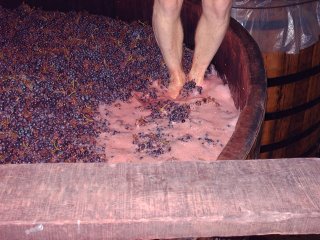Ive been asked this question a few times recently. So, while my nose is still out of action I thought I would use the opportunity to answer a fairly important question - what is TCA?
The most simple answer is that Trichloroanisole or TCA is a chemical compound (C7H5OCl3) that adversely affects the aroma and taste of contaminated wines. It is a highly volatile chemical that is dectactable in amazingly small concentrations in wine. In white wines the threshold is as little as 2 parts per trillion (or in slightly simpler terms 0.000000000002g in a litre of fluid - thats really small), it goes up slightly to 5 parts per trillion for reds (not sure why, maybe because reds tend to have more complex aromas going on). But having said that everyone has different tolerances to TCA. Im very sensitive to it, and consequently Ive been able to identify tainted wines that my colleagues havent. I once came across a gentleman who was completely impervious to the TCA and was quite happily quaffing a very very very badly tainted bottle. This bottle was so badly tainted that I could smell it halfway across the restaurant (the Strathearn at Gleneagles is hardly a small room!), yet he just couldnt smell the taint at all!
For those that are able to detect it, TCA presents variously as a wet cardboardy smell, damp musty cellar like aroma, wet soil, wet old wood, or sometimes a slightly penicillin-ish like aroma. Depending on the concentrations in the wine, the aroma can be very subtle or seriously pronounced. If the wine is very cold, then the TCA will be held in solution in the wine and the aromas will be very difficult to detect until the wine warms up and the TCA becomes more volatile. This is often why in a restaurant a wine will be passed fit for service by either the sommelier or the customer (or both) and then as the wine warms up in the glass the TCA becomes more obvious and the wine is shown to be contaminated. As far as I know it isnt toxic, but considering that its primary chemical precurser is Trichlorophenol or TCP as it is more famously known I shouldnt think it would do you any serious damage. Particularly as it is often only found it very minute concentrations.
There is a huge amount of debate as to the cause of TCA contamination. Theres actually quite a good discussion about it on wikipedia at http://en.wikipedia.org/wiki/Cork_taint which covers it in much better detail than I care to get into. Needless to say, many of the statistics surrounding actual contamination rates are subject to much speculation and skepticism depending on whom sponsored the research - the pro or anti cork lobbies are quite dominant in this arena.
For more information check out the following pages:
http://www.aromadictionary.com/articles/corktaint_article.html
http://www.wineinstitute.org/industry/tca/
Subscribe to:
Post Comments (Atom)





No comments:
Post a Comment